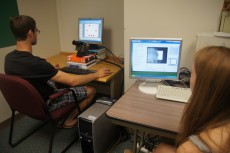Psychology students study eye movements with help of special tracking device
 Christian Cacciatore ’14 (left) and Belén Martinez-Caro Aguado ’16 model how they used Associate Professor of Psychol...
Christian Cacciatore ’14 (left) and Belén Martinez-Caro Aguado ’16 model how they used Associate Professor of Psychol...
Each year, Associate Professor of Psychology Naomi Wentworth adds functionality to the eye tracking equipment she first purchased six years ago, which allows her students and her to develop new studies identifying the relationship between eye movements and cognitive processes.
This summer, for example, her Richter Scholar team comprising Belén Martinez-Caro Aguado ’16 and Keke Roberts ’16 with help from Christian Cacciatore ’14 used the device and accompanying software to determine the role that different distractors play in diverting a subject from a particular task.
They tested 10 College students, five in each of two different conditions, and conducted 25 trials per participant.
“The study revealed that, statistically, there is a significant difference in the amount of times the participant looked at a distractor when it was moving than when it was not moving,” Martinez-Caro Aguado said.
Wentworth appreciates the eye tracker not only because she has been able to build onto its capabilities piece by piece, but also because it’s simple for her students to use. Her Richter Scholars, for example, learned how to set it up, operate it, and collect data in three week’s time.
She hopes to add a head-mount tracker to her inventory in the near future because she would be able to study her subjects completing navigational tasks.
College students often are the subjects of Wentworth’s research because they are “easy to come by,” she jokes, but most of her work involves babies and young children. That’s because “their visual system and cognitive system goes through many transformations, and because there’s the possibility of things going wrong. The earlier you can identify it and intervene with a problem, the faster you can turn it around,” she said.
She enjoys getting her students excited about the possibility of solving dyslexia or other communication obstacles. She also appreciates the challenge of finding the correct experiment to study a task that reveals an underlying cognitive process.
And despite all of the questions she already has answered throughout her career, “I feel like I’m not done yet.”
News Contact
Kellie Doyledoyle@lakeforest.edu
847-735-6177